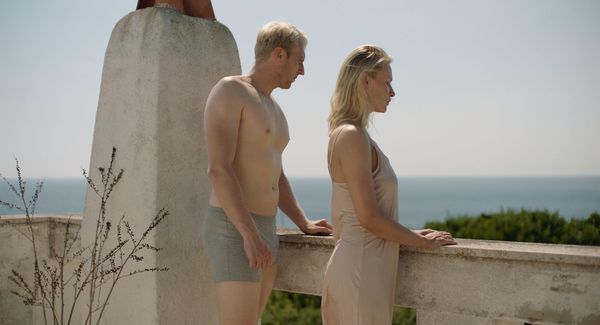 |
| Dobromir Dymecki and Agnieszka Zulewska as Adam and Anna in Silent Land |
Although Agnieszka Woszczynska and I have spent a few days arranging to meet to discuss her new film, Silent Land, which is screening as part of the Glasgow Film Festival, I’m honestly surprised that she makes it. It’s a very difficult time for her. She’s in Warsaw, which sits on a long road which runs east across the border with Ukraine. Somewhere along that road lies a column of Russian tanks, slowly moving westward. With friends in vulnerable situations, and not feeling very secure herself, she tells me that it’s hard to focus on promoting the film, but she seems to appreciate the distraction.
Though it focuses on just one couple and the decisions they make or fail to make after an accident at their holiday home, Silent Land is a film about big issues and, in particular, about the nature of European identity in the 21st Century. It’s a contribution to those vital conversations we need to be having in order to move away from war and recognise our responsibilities to one another. Whilst being caught up in conflict tends to make the world feel smaller, narrowing down our options, this is a film full of pale colours and open space, taking place under a big sky. It presents an environment which is full of possibility, if only its characters will recognise that.
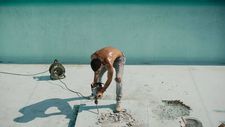 |
| Rahim (Ibrahim Keshk) works on the pool Photo: courtesy of Glasgow Film Festival |
“I think, personally, the less you show, the more questions you can ask,” Agnieszka says of those choices. “Not giving the answers. That's why a lot of things are happening beyond the frame. I wanted to create tension and I had a great cinematographer. My previous short film, Fragments, that was premiered in Cannes with the same actors [Dobromir Dymecki and Agnieszka Zulewska], and with the same kind of camera work, its theme is about alienation – not only from each other, but also from the world. Also the camera is very alienated. We use mostly 35 and 40 millimetre lenses. After the accident, we try to get closer with the camera and lenses to the characters, but we are not so close – only when Adam is crying, maybe, at the end of the film.
“I wanted to look at them from a distance to show the lack of emotions. This kind of emotional bankruptcy, as I like to call the state of my characters. And you're asking also about the set design, well, we wanted everything to be coherent and clear and clean. My characters are cleaning all the time and are so tidy, so I wanted to create a space that corresponded with their state of mind. And we found a lovely place. We painted and did some art design with Ilaria Sadun, my Italian art director. And actually, everything we found there was really prepared.”
I note that the tall, pale bodies of the Polish lead actors fit that look really well, whilst making them look alien in the context of southern Italy where their characters are on holiday. They were the natural choice, she says, because they had both starred in Fragments, and she has actually made three films with Dobromir.
“When it comes to the rest of the actors, the French couple is kind of the mirror for my main characters. And they seem to be completely different. I mean, they look different, they behave differently. Everything is different. But at the end, it turns out that they are the same. So now none of them is either good or bad. They’re really very similar, and when it comes to the cast, I dreamed about Jean-Marc Barr being a diver, remembering The Big Blue with him. I was only concerned as to whether he would agree or not, because maybe he would be like, ‘Oh, I played a diver so many years ago, I don't want to go back to it.’ But no, he agreed. He loved the script. He's a wonderful partner at work, a nice person, very professional.
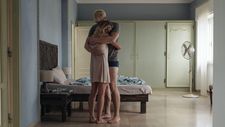 |
| Adam and Anna hold it together |
“It was my film début so I was afraid that maybe an actor like him would come and say ‘I know what to do,’ but it wasn't like that at all. He was listening to me, the cooperation was great. And then I was searching for a partner for him. Younger, very subtle, very delicates, but on the other hand, very strong inside. She's unhappy, Claire, and she knows it, and she’s trying to find a way out of this trap. We went to Paris with Jean-Marc Barr to have the casting for his wife, and then I meet Alma Jodorowsky, who is wonderful, a wonderful woman and a wonderful actor. And I'm really happy that I met them.”
I loved the sex scenes between the main characters, I say, because there’s a sense of anhedonia about everything they do, but it’s especially acute there. They don’t really seem connected to anything.
“Well, they both have orgasms,” she says. “I mean, they're satisfied. But the way they approach, it's very routine, the same as their jogging every morning. We can expect that back in Warsaw they have a really short breakfast together, they go to work, they come back and have sex and go to sleep. So it's about their routine as well.
“I don't like films when you show characters kissing, and then you show the next morning when they're sleeping together. We do have sex in real life, why shouldn't we show it in the cinema? But I didn't want to be a pervert. I wanted to be subtle, and I think it worked. There is a distance, as you said, but on the other hand, it's the only moment when they hug. It's the only moment when they are really together.”
The actors do a lot with their bodies all the way through the film. There’s a wonderful moment when the local people are celebrating a festival and Anna is drawn into a dance in which she moves around stiffly, like a puppet, with a miserable expression on her face.
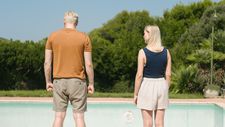 |
| Adam and Anna reflect on their inactions Photo: courtesy of Glasgow Film Festival |
“For me – I know it may not be for everybody, but for me – her collapse in the dance is the collapse of European values,” she says. “Maybe right now, we shouldn't speak only about Europe, but actually the world. I try to think about everything that happens on the meta level, not only just what you see, but how I would like to interpret it and show it. The real level is that Anna is the person who wants to go back to established patterns of behaviour. She wants to go back to Warsaw and she wants to forget. And this is her collapse, while Adam is changing. He can confirm that in his feeling of guilt, and he knows, finally, that he did a bad thing. Anna is coming to him in the final scenes and saying ‘We are not bad people,’ and he says ‘Yes, we are bad people So Anna is collapsing and Adam is rising.”
I mention that I love the way that Adam moves differently in his dream sequences, much more hulking and animalistic than he is in the scenes set in the real world, but it seems that this may have been something Dobromir brought to the character without her input. Those dreams, she says, are about him moving through the forest to meet his feeling of guilt, so that may be why he walks differently.
Something else that stood out to me about the film, I say, was the sound design. For a lot of directors, sound seems to be something that is other people's area, and they don't think about it necessarily all that much. But here, it felt like it was very much a central part of the film. How involved was she in designing that from the start?
“There is no music in my film,” she points out. “Just some ambient sounds. I knew it from the very beginning. For me music emphasise your feelings, says ‘You have to love now, now you have to cry, now you have to wonder and now you have to be sad.’ And I didn't want it. I just wanted to have the pure screen and I didn't want to direct the viewers to feel, so there is no music, but I think that this precise and beautiful work laid down by my sound designer is actually a soundtrack. I was working on the sound with Marek Poledna. He's from Czech Prague. So we made this beautiful sound design. And some of the things were already in the film, but not all of them.
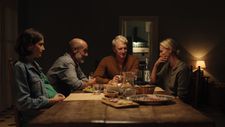 |
| Two couples mirror each other |
“He's very talented, and he helped me to create this amazing soundtrack. For instance, when Rahim (Ibrahim Keshk) is drilling the pool, I knew that it was very inconvenient for the characters, so I wanted to have the sound be so loud that it was also inconvenient for the viewers. It was like we were thinking about it scene by scene, how loud it's supposed to be or how quiet, and it is very precise.”
I note that new filmmakers often make the mistake of rushing and trying to put too much in there, and this is a very slow film. That takes a lot of confidence. How did she approach it?
“I was trying to work with slow cinema at film school,” she says. “I mentioned my short film Fragments. Silent Land is actually the continuation of Fragments because it has the same characters and the same cinematographer and the same actors. I felt I had less screen time to tell a story about them, so that's why I brought them back and put them in Italy, to have more time to talk about them. Fragments is also without music, with disturbing sound design. To me cinema starts where the words end, with the cinematography and images are communicating emotions and meanings, and I need the time to be with these images. Because my characters are not speaking much, you need time to observe them, time to look at their facial expressions, even though the camera is not close. I need this space so as not to rush the viewer. I think that when you have time, and when you are quiet, you can establish a specific relationship between the viewers and the screen, and then magic things can happen.”
We discuss the film’s setting in a part of Italy where desperate migrants often try to cross the sea to enter Europe, and the particular forms of racism which emerge from some people’s reactions to that.
“I started to write a script after the catastrophe on Lampedusa happened, when I got to know how we are passive, and we want to close our eyes and our borders. And saying ‘we’, it's not just Italy, I'm not blaming Italy. It's set in Italy for two reasons: because of immigrants who have come from very close to Italy, and because I simply love Italy, and I want to spend the rest of my life there. My main reason for writing the script was immigrants, tragedy and how passive we are, how we are focused on ourselves and our convenience. This is our strategy of survival, you know, just to be happy and not to see anything that's around us. And that’s Europe, and not only Europe, I mean, the whole Earth actually. And that's why I decided to have this topic.
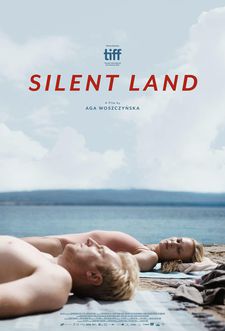 |
| Silent Land poster |
“It took me five years to make this film, from the beginning of writing the script with my co-writer (Piotr Litwin) till the end of editing. And there is no reason to spend this five years of life speaking just about the characters, I mean, I need something more. I need to speak about the reality that concerns me, about very important issues. And that's why my next film will be about ecological catastrophe. And then their characters, but it's like always, it's the very important case, and then the characters develop, not the opposite. That's why my themes are so conceptual. They are not character driven films. They're more conceptual films.”
How does she feel about responses to the film so far?
“After Toronto, there was a lot of reviews, and almost every one was really good, so I was really happy. But then I came to Europe and there were most no reviews. And I was so surprised because I made this film for Europe and about Europeans, but it has the biggest applause in America. I'm waiting for Polish distribution or a Polish première. I'm really curious as to how Polish people will react to Polish people who I consider as racist: my characters, surely. So I don't know. I’m really curious.”
Silent Land will premiere at the Glasgow Film Festival on 7 March and the Kinoteka Film Festival on 9 March and will be released in UK cinemas in July 2022.





















